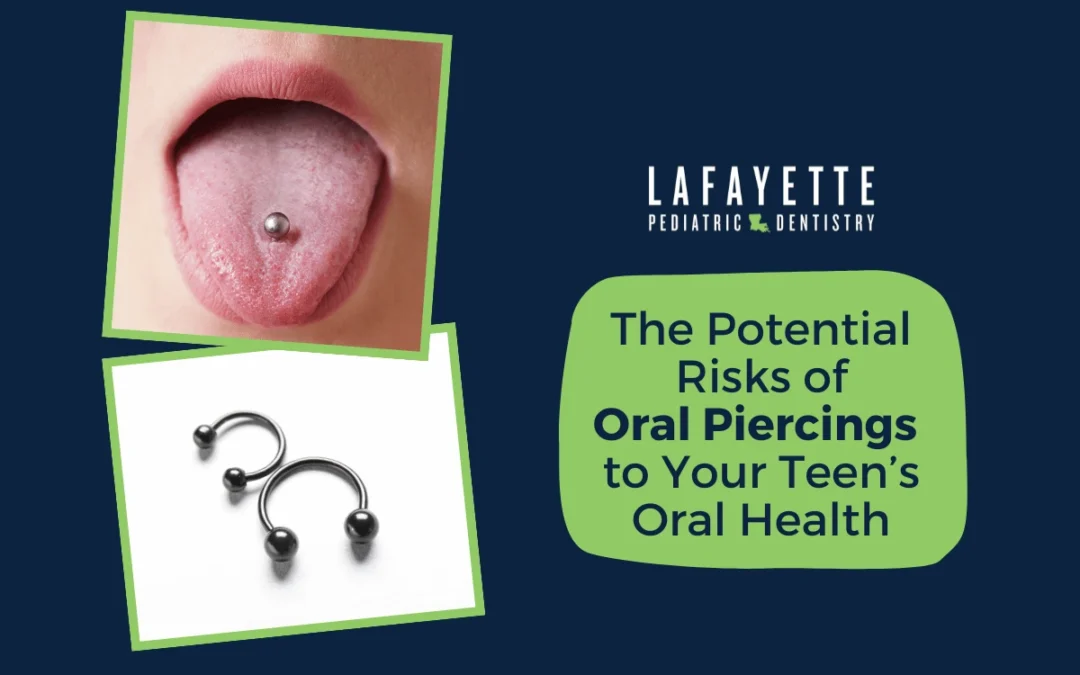Oral piercings have been used as a form of body decoration since ancient times. Today, it is known as a form of self-expression and is becoming increasingly popular among adolescents. This form of body art, unfortunately, can bring on health complications.
Seemingly innocent oral piercings can be extremely hazardous to the oral health of teens. Smoking, playing with the piercing, nail-biting, and lip-biting are all predisposing factors for developing complications such as chipped teeth, infection, gum disease, and even nerve damage. Therefore, it is important to consult a dentist for advice on maintaining good oral hygiene and avoiding any potential issues that may arise from having an oral piercing.
Oral Piercing Health Risks
Let’s take a look into some of the possible health risks and complications caused by oral piercings.
Tooth damage
Playing with the mouth jewelry or accidentally biting down on it can all cause the teeth to crack or chip and expose the nerves. Fillings are at risk of being damaged, too. In addition, the constant friction with a piercing can wear away the tooth enamel, resulting in cavities forming or further tooth decay.
Read also: The 5 Most Common Causes of Cavities in Children
Infection, pain, and swelling
Oral piercings, such as lip and tongue piercings, are much harder to keep healthy than ear piercings. Since the mouth area is constantly exposed to moisture, it becomes an ideal breeding ground for bacteria that can lead to harmful side effects. If an infection develops, symptoms such as pain and swelling occur and need to be immediately addressed by a dentist.
Gum recession
If a piercing is placed too close to the gums, the constant contact will wear away the gum tissue. Individuals with oral piercings are also more likely to develop gum recession than those who are non-pierced, with a study showing that gum recession was present in 50% of people with lip piercings and 44% of people with tongue piercings.
If gum recession is left untreated, it can cause tooth sensitivity and even become so severe that the tooth may fall out.
Nerve damage
An oral piercing can cause temporary or permanent nerve damage that could include numbness, difficulty with chewing and speech, and may even impact the sense of taste.
Diastema
When there is constant pressure on the teeth from the piercing or continuous playing with the jewelry, diastema can form. Diastema refers to a midline gap between the upper central incisors or the two upper front teeth. If this happens, it will require orthodontic treatment to correct, which can be costly.
Dental X-ray issues
Piercing jewelry in the mouth can be a hazard when it comes to X-rays. The metal often shows up very prominently, creating an obstruction that can make it difficult for the dentist to accurately detect cavities or other dental issues.
Teenagers with oral piercings who are fully aware of the health risks but still wish to keep their piercings can take the below steps to avoid some of the negative effects on their oral health. Of course, the best option is to take preventive action and remove any mouth jewelry before it has the chance to cause an issue or avoid getting piercings altogether.
How to Avoid Oral Health Issues Caused by Piercings
Keep it clean
It is very important to keep the piercing site as clean as possible by rinsing the mouth after every meal. This will help to prevent any leftover debris from building up. You should also gargle twice daily with an antimicrobial mouth rinse.
Always use clean hands
When you need to remove or check your piercing, always clean your hands first to prevent infection.
Don’t fidget with the piercing
Avoid playing with or clicking the jewelry to minimize damage to the teeth.
Check the piercing periodically
Frequently check the tightness of your jewelry to reduce the risk of breaking or swallowing the pieces.
Remove the piercing during sports
Always remove the piercing or wear protective mouthguards when playing sports to reduce the risk of mouth injury.
Schedule regular dental checkups
Keep regular dental appointments for teeth cleaning and checkups to prevent and treat problems that may occur.
Practice good oral hygiene
Practice good oral hygiene by brushings and flossing at least twice daily. This can help to keep your teeth and the piercing area free from infection.
Call Lafayette Pediatric Dentistry if a problem occurs
Always inform Lafayette Pediatric Dentistry at the first sign of swelling, redness, or infection. The sooner we treat the issue, the better the outcome will be.
Many teenagers choose to get oral piercings as a form of self-expression, but are they truly aware of the potential risks to their oral health? Since oral piercings require constant upkeep and can cause a series of complications, we recommend talking to a dentist before and after getting a piercing. Lafayette Pediatric Dentistry can provide you and your teenager with helpful tips on how to avoid oral health complications due to piercings.
To schedule an appointment with Dr. Anita Gouri, fill out this form. Dr. Gouri and her dedicated, skilled staff will take the time to go over how oral piercing can impact your teenager’s oral health and how you can minimize the risks. Dr. Gouri is the dentist for teens near you in Lafayette, LA, who is highly qualified to answer any oral health question you may have. Let Lafayette Pediatric Dentistry bring life to your children’s smiles.
Sources:
